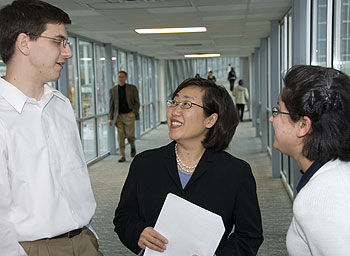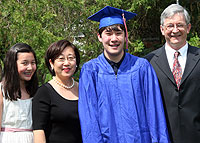“There’s a tendency for academic advisers to plan an awkward yearly meeting over bad pizza, and it’s glaringly clear they don’t want to be there,” says Adam Greenbaum, a third-year M.D./Ph.D. student. “In contrast, Dean Chung invites us over to her house for dinner several times a year, engages us in really humorous conversations and then gives us bags of leftover food at the end of the night. I’ve learned that finding a leftover piece of steak in my refrigerator the next day does far more to make me happy than any advice possibly could.”
Greenbaum is among the many colleagues and students who describe Koong-Nah Chung, Ph.D., assistant dean for medical admissions and student affairs, as a nurturing, enthusiastic advisor who’s a wonderful ambassador for the School of Medicine.

“She, it seems, is everywhere,” says Leslie Kahl, M.D., associate dean for student affairs in medicine. “She attends student functions, often with one of her children in tow, offering good ears, broad shoulders and wise counsel to students in need. She is always ready to contribute to whatever project is under way and is a critically important member of our team.”
Chung also directs the medical student summer research program, which has tripled in size under her supervision, chairs the Southern admissions committee and oversees the selective program for first-year students.
Alvin S. Wenneker, M.D., a retired clinical professor of medicine who has served on the admissions committee with Chung for more than three years, says she is able to evaluate medical school applicants because she has a great understanding of people and their motivations. “I’ve found her to be intuitive, very intelligent, compassionate and a wonderful facilitator,” Wenneker says. “Working with her has been a highlight of my medical career.”
A unique history
When Chung was 6, her father, a physician, left their native South Korea to pursue a doctorate in microbiology at Michigan State University. A year later, her mother and two of her three sisters followed him to East Lansing. Chung and her remaining sister lived in the family home in Seoul with their grandmothers, cousins, two aunts and two uncles for the next three years.
“It wasn’t terribly difficult for me to be away from my parents,” Chung says. “I just remember it as being fun with all of my relatives. My grandmothers were wonderful role models — gracious, generous, kind, independent women.”
In 1967, Chung and her sister joined her family in East Lansing, where they lived for a year before moving to Ann Arbor, where her father had taken a job at the University of Michigan. Although she spoke no English when she arrived in the United States, Chung thrived in an integrated public school system in Ann Arbor. Her family also lived in graduate housing with many other international students.
“We were so fortunate to go into a university setting,” she says. “Our house was overflowing with newcomers all the time.”
She and her family, which soon had five daughters, often spent weekends with other Koreans, picnicking and picking gossari, a fern used in many Korean dishes, in a nearby forest.
In Hershey, Pa., where Chung attended high school, she was elected the first female student government president, a monumental feat in the 1970s. “I ran on the platform of the first girl and a Coke machine,” Chung says with a laugh. “We got a Coke machine.”

She returned to Ann Arbor to attend the University of Michigan as an undergraduate. She dabbled in art, psychology and women’s studies before declaring biology as a major during her junior year.
“And that was only because I ended up washing dishes in the laboratory of Dr. Harry Douthit,” she says. “My parents really wanted me to go to medical school, but I had zero interest in medicine.”
Chung conducted some experiments with Douthit, who studied bacterial spore germination, and decided during her senior year that becoming a scientist was a perfect career choice. She set up a cot in his lab, where she didn’t mind taking samples at different times throughout the night.
“I just loved it,” she says. “I like interacting with people, but I also like to have quiet time.”
Douthit told Chung she should go to graduate school and encouraged her to look at Washington University School of Medicine. When she visited, she was impressed that she could pick her own lab and that other scientists were extremely welcoming.
Chung chose biochemistry because she enjoyed organic chemistry and biochemistry in college. “I thought the pathways were beautiful,” she says. “I think it’s fascinating how they fit together and you come up with an answer at the end.”
Her graduate school mentor, Philip D. Stahl, Ph.D., the Edward Mallinckrodt Jr. Professor and head of Cell Biology and Physiology, says Chung is a talented scientist who has great balance in her personal and professional life. “I have the greatest respect for Koong-Nah, and I think she’s highly suited to work with students as an advisor and role model,” he says.
After completing a postdoctoral fellowship at the University of California, Berkeley, and a senior staff fellowship at the National Cancer Institute, Chung joined the WUSTL faculty as a research assistant professor in cell biology in 1996.
Her research focused on protein trafficking, including the role of cell membrane structures called caveolae in cholesterol trafficking, and, in 1995, she received the Young Investigator Award from the Society of Biomedical Research.
|
Koong-Nah Chung Education: B.S., University of Michigan, Ann Arbor, 1980; Ph.D., molecular biology and biochemistry, Washington University School of Medicine, 1986 Family: Husband, John Olsen, Ph.D.; son, Percy, a freshman at Washington University; daughter, Eudora, a seventh grader at Wydown Middle School Hobbies: Yoga, meditation, spending time with family, visiting national parksPet: Dog, Jack. “He’s so loyal,” Chung says. “He’s my first pet, and I now understand why people love their pets so much.” Entertaining: Has Medical Scientist Training Program and M.D. students over to her house four or five times a year. “I serve them steaks and salmon, the two things that I can cook OK,” she says. “I make sure I don’t serve them pizza.” |
She was named instructor of cell biology and physiology in 1999, a title she retains, in addition to being named assistant dean for admissions and student affairs the same year.
Chung says she sometimes misses research — working with her hands and the highs of discovery — but she always enjoyed mentoring students in the laboratory.
“The best part of my job now is interacting with the students,” she says. “I had wonderful role models who believed in me, and I believe in our talented and idealistic students. Their potential is boundless.”
The family’s importance
In her free time, Chung enjoys exercising at a gym, yoga and meditation. She is married to John Olsen, Ph.D., whom she met during orientation in graduate school. He is an investment adviser.
Chung and her husband have two children, Percy, a freshman at WUSTL, and Eudora, a seventh grader at Wydown Middle School in Clayton. Chung is grateful to her parents, whom she says dedicated their lives to their children’s education. She also emphasizes to her children the importance of education, service and finding careers that they’re passionate about.
She “drags” her two children to a national park each summer. “We make them go on hikes, and we hear a lot of complaining,” Chung says. “And we threaten to never bring them to another national park. But I think it’s important to see our parks, and I hope they appreciate these trips someday.”
Sunday evenings, her family often has “cousin dinner” with their other St. Louis relatives — her parents and two sisters and their families.
When the week begins, Chung is motivated to come to work because she feels a great sense of pride in WUSTL. “I admire everyone I work with,” she says. “Washington University sort of draws you in, and you become very loyal. We all know we have a good thing going.”
And W. Edwin Dodson, M.D., associate vice chancellor and associate dean for admissions and continuing medical education, says he considers Chung a treasure.
“Koong-Nah’s most distinctive characteristic is her genuine caring about the students individually and the support that she provides as she helps them explore their options, identify their goals and pursue their dreams,” he says. “The students love her, and it’s easy to see why. She’s also one of the best medical school admissions professionals anywhere.”